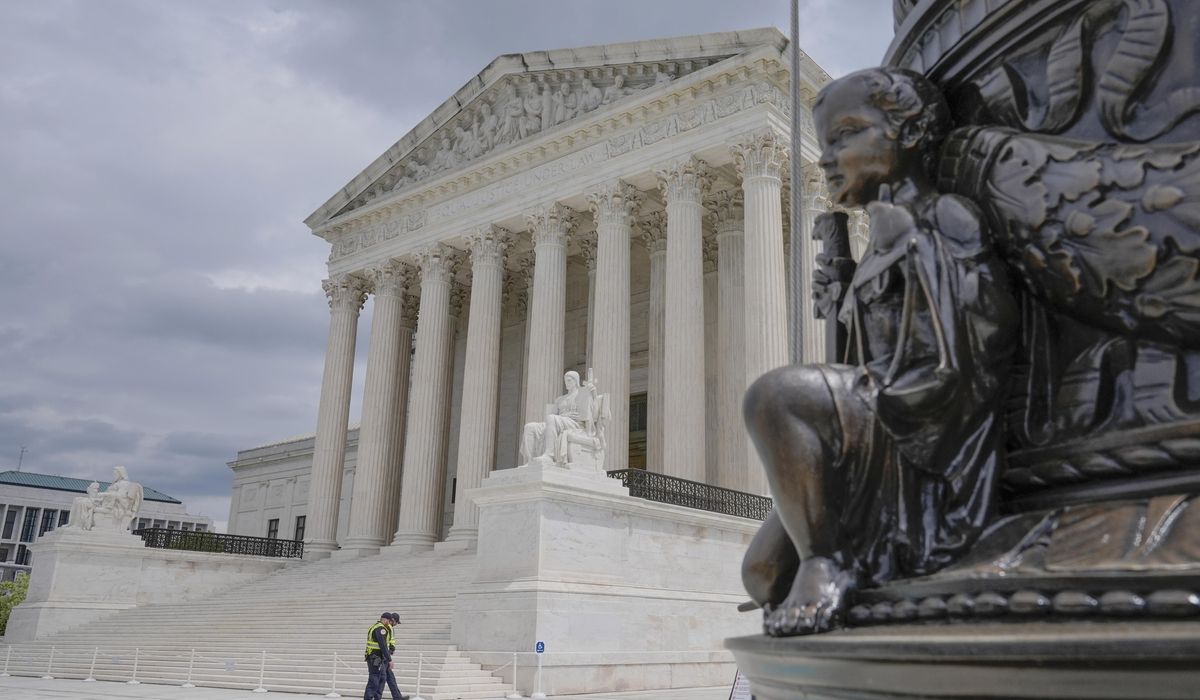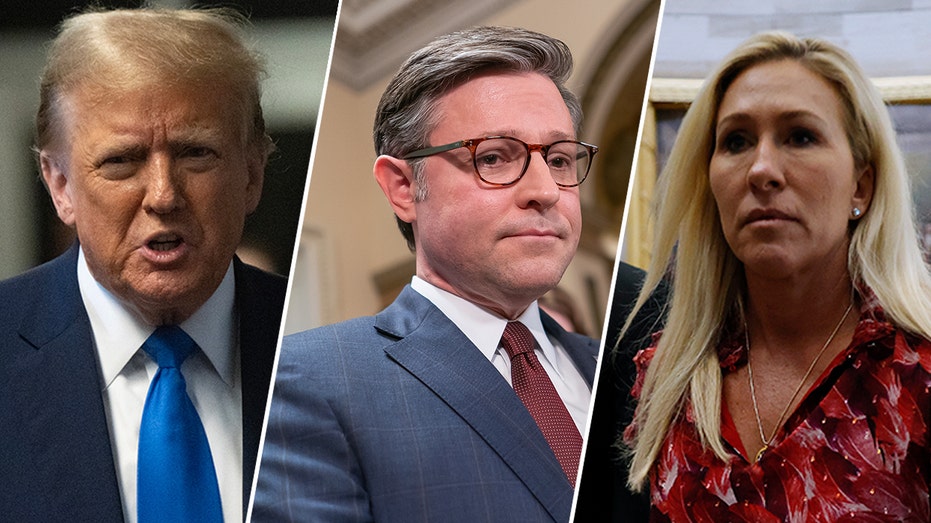

The Supreme Court’s decisions this term will advance federal law on the powers of the presidency and the administrative state, and give the high court a chance to clarify major rulings in recent years on abortion and the Second Amendment.
The justices wrapped up a momentous week, hearing final arguments of the 2023 term in cases that test whether cities can fine homeless encampments that create public health and safety concerns, whether emergency rooms must perform abortions in states that ban the procedure, and whether former President Donald Trump enjoys absolute immunity from criminal charges.
Court watchers say the justices will work diligently to issue opinions on all those cases and more by the end of June or early July, before heading out on summer recess.
“The Court is behind the usual pace of deciding cases. There are no significant cases decided yet. June should be a crunch,” said Josh Blackman, a professor at South Texas College of Law.
“The Court never goes past the first few days of July, so I think it’s a safe bet that, however hard the justices and their clerks have to work through June, we’ll be done by the Independence Day extra-long weekend,” said Ilya Shapiro, director of constitutional studies at the Manhattan Institute.
Presidential immunity
On the final day of arguments, the justices heard from Mr. Trump’s legal team, which argued he can’t face criminal prosecution because the president is immune from charges for official duties.
The Justice Department, led by the team of Special Counsel Jack Smith, who is prosecuting two cases against Mr. Trump, said the framers understood a president can be held accountable because he is not a king, and no one is above the law.
The case, Trump v. United States, will determine whether Mr. Trump’s charges for allegedly committing election fraud in contesting the 2020 results and mishandling classified documents will head to trial.
The justices appeared open to drawing a line on what constitutes an official duty for which a president could be charged. If they issue a test for lower courts to apply, that could delay the criminal trials from starting against Mr. Trump ahead of November’s election.
Administrative state
The justices also grappled with major disputes over the reach of the federal bureaucracy.
In one dispute that tests what is known as “Chevron deference,” the high court will decide whether courts must defer to executive agency heads when a law passed by Congress is ambiguous.
“Chevron deference” is a term of art that lawyers gave to the precedent of how courts have treated the 1984 ruling in Chevron U.S.A., Inc. v. Natural Resources Defense Council, which involved a fight between the energy giant and the Environmental Protection Agency and its environmental allies. The court, in a 6-3 ruling, said the EPA’s interpretation of a law was reasonable and that courts should defer to agency judgment in cases in which the law was ambiguous.
The new legal battle that the justices are weighing this term was brought by Rhode Island fishermen who say a federal rule requiring the industry to pay for federal observers on their boats will hurt them financially and is unlawful.
The justices could chip away at Chevron if they side with the fishermen and decide legislation and federal rules that are ambiguous can’t be left up to executive agencies to interpret and implement.
In a separate legal battle involving the powers of executive agencies, the justices could dismantle the Consumer Financial Protection Bureau — the brainchild of Sen. Elizabeth Warren, Massachusetts Democrat.
The CFPB is a Wall Street regulator that Ms. Warren envisioned as immune to political pressure with its own budget and a director insulated from meddling by an antagonistic president.
The agency’s mandate has not fared well in the courts, and some judges say Ms. Warren has created an unconstitutional mess.
The Supreme Court ruled previously that a CFPB director insulated from presidential oversight violated the Founding Fathers’ ideas about accountability.
The latest case is a landmark legal battle over the separation of powers that legal experts said could have implications reaching the Federal Reserve, the nation’s independent central banking system. Under the law that created the CFPB, the Fed provides the agency’s annual funding.
The question before the justices is whether Congress can relinquish its power of the purse to another branch of government.
The Community Financial Services Association of America Ltd. and the Consumer Service Alliance of Texas, which brought the challenge, said empowering the CFPB to set its budget undercuts the political accountability required by the Constitution.
Abortion
The Biden administration has urged the Supreme Court to declare federal law supreme and to force states with severe abortion bans to allow exceptions in emergency cases where a woman’s health is at risk.
The case rose to the justices two years after the decision in Dobbs v. Jackson Women’s Health Organization, which overturned the landmark 1973 Roe v. Wade ruling and erased the federal guarantee of abortion rights.
The issue of abortion is now back with the states, but the Biden administration is trying to refashion at least some national standards by using the Emergency Medical Treatment and Active Labor Act, which applies to hospitals that accept Medicare money. Under that law, hospitals must deliver stabilizing treatment to emergency patients.
The administration says states like Idaho with strict abortion bans that only permit the procedure to prevent death of the pregnant woman conflict with the federal law.
The justices will decide how to square state laws on abortion with the Emergency Medical Treatment and Active Labor Act.
The high court also is grappling with the Food and Drug Administration’s move to expand access to the abortion pill, in a separate legal battle.
During nearly two hours of oral arguments, justices heard a challenge brought by pro-life doctors over the FDA’s changes to its distribution and usage of mifepristone, which is used with the drug misoprostol to terminate a pregnancy.
The FDA moved in 2021 to eliminate the number of in-person doctor visits needed to obtain mifepristone and allow it to be used longer into pregnancy, from seven weeks to 10 weeks. The change in the gestational period was adopted in 2016.
The providers say they have seen women harmed by taking the drug. The women go to emergency rooms for care, diverting resources and putting pro-life doctors’ conscientious objections at stake.
The federal government, though, noted that the drug has been used throughout five presidential administrations and argues that more than half of American women who choose to end pregnancies use mifepristone.
Guns
The administration has asked the justices to prevent domestic violence abusers from possessing firearms in a move to preserve some gun-control measures.
The case before the justices involved Zackey Rahimi. Prosecutors said he had a history of reckless shootings but no convictions on his record. After a tense encounter with Rahimi, an ex-girlfriend obtained a protective order from the state of Texas. Under federal law, that meant he was barred from possessing a gun.
Afterward, Rahimi was involved in five shootings and was convicted of illegal gun possession.
A federal appeals court upheld the conviction initially but reversed itself after the Supreme Court delivered its landmark ruling in the Bruen case in 2022. Bruen reaffirmed Americans’ fundamental right to own a gun and forbade any restrictions that clashed with what those in the nation’s earliest days would have deemed acceptable.
Bruen has also prompted other courts to question laws prohibiting drug users or even felons from possessing guns.
The justices will issue a decision on how to square the Bruen ruling with current firearm laws involving certain classes of individuals.
First Amendment, social media
Aside from the Second Amendment debate, the justices are also grappling with a First Amendment clash over states like Florida and Texas cracking down on social media bias.
Justices seemed skeptical of the states’ cases that they can control how Facebook and YouTube police their pages.
The battle involves laws that Florida and Texas enacted in 2021 in the wake of the 2020 election and amid the censorship battles of the pandemic’s early years, when platforms were scouring their sites for content they deemed inappropriate, inaccurate or harmful.
Egged on by the federal government, the social media giants limited the reach of posts questioning the push for COVID-19 vaccination and wondering whether the coronavirus had escaped from a Chinese lab. Twitter blocked access to a New York Post article revealing the Hunter Biden laptop, wrongly claiming it was Russian disinformation.
Texas’ law prohibits social media companies from removing and moderating content some might find offensive or hateful. It also requires disclosure of some business practices, such as algorithms used to promote content.
Florida’s law calls for fines of up to $250,000 per day for large social media companies that de-platform political candidates.
One federal appeals court upheld Texas’ law, and another ruled against Florida’s legislation. Both laws are on hold pending Supreme Court action.
-Stephen Dinan contributed to this report.















